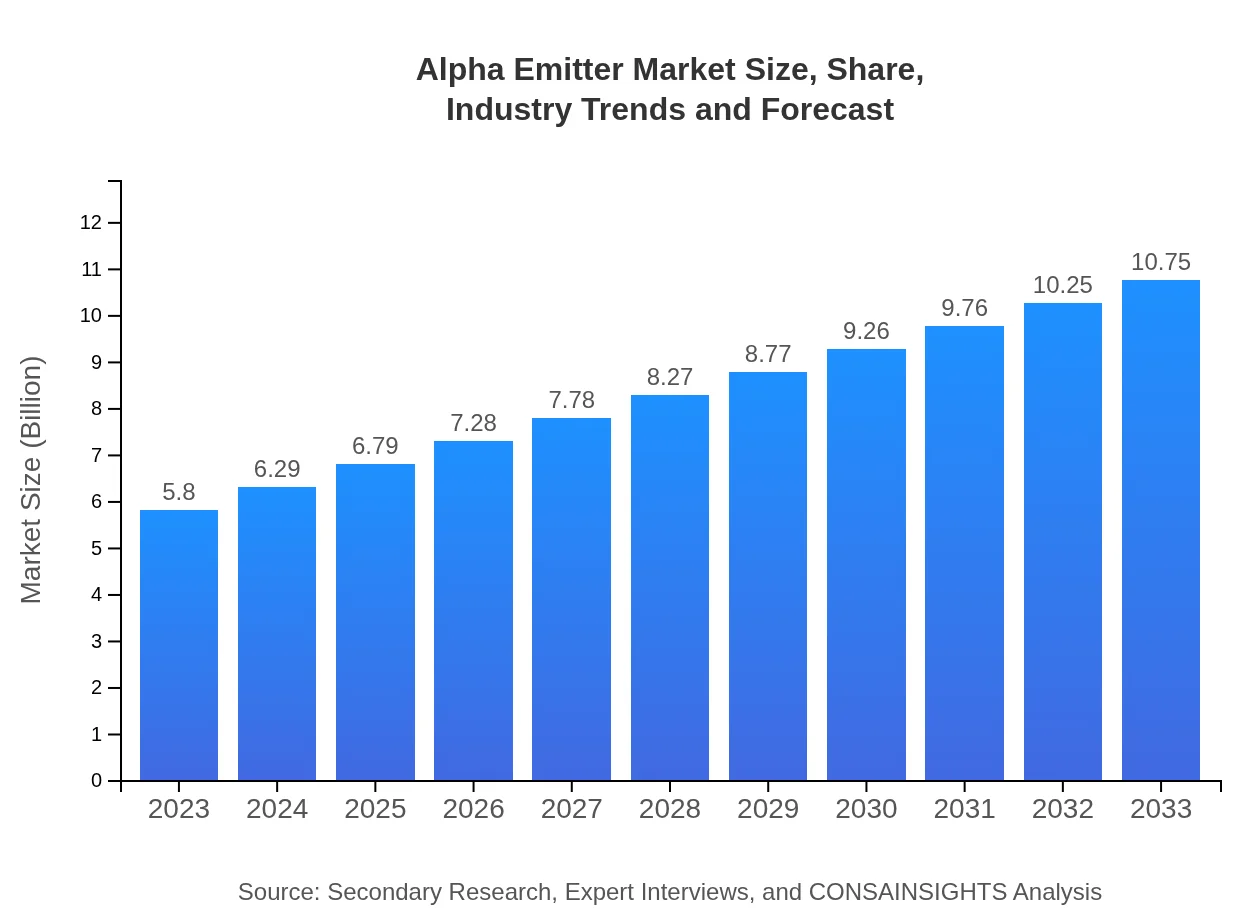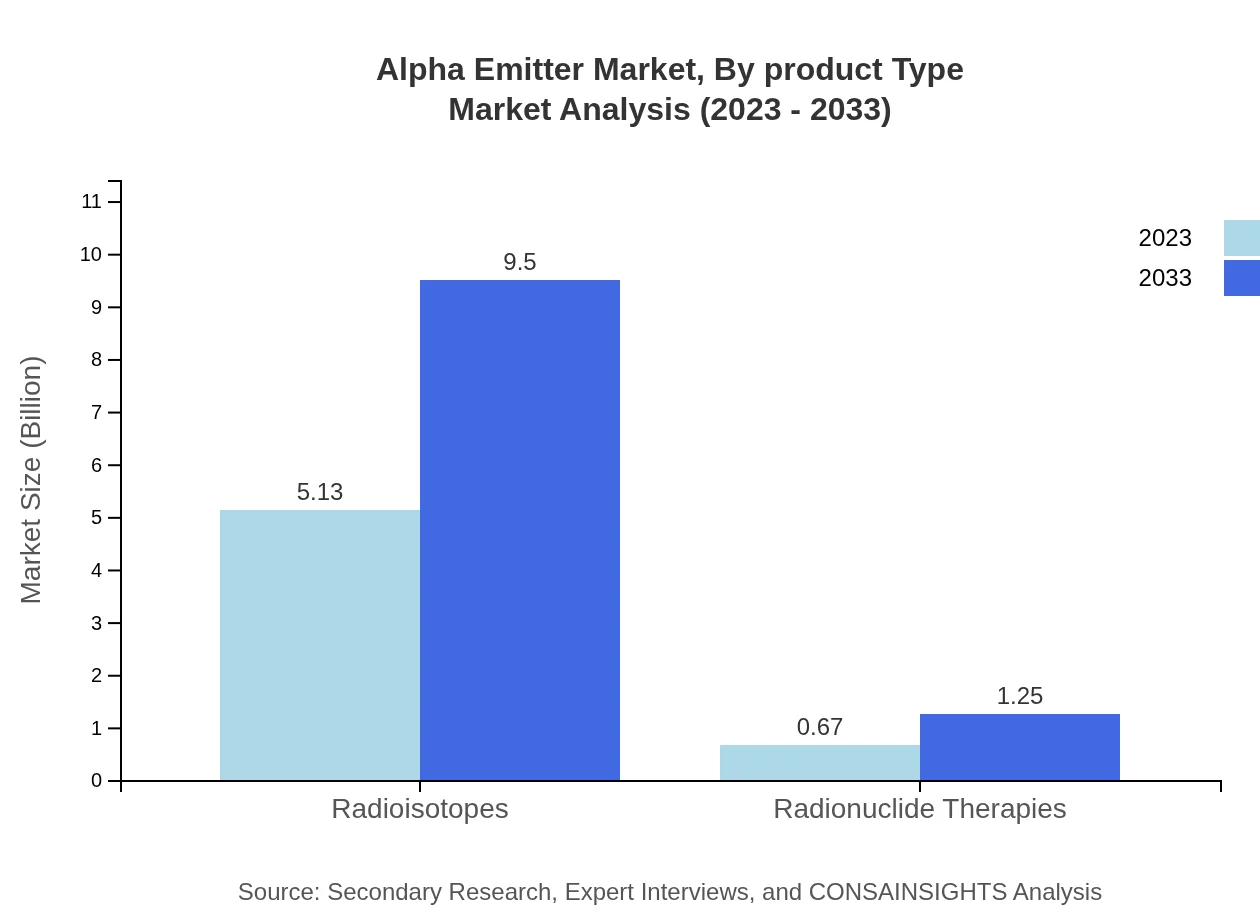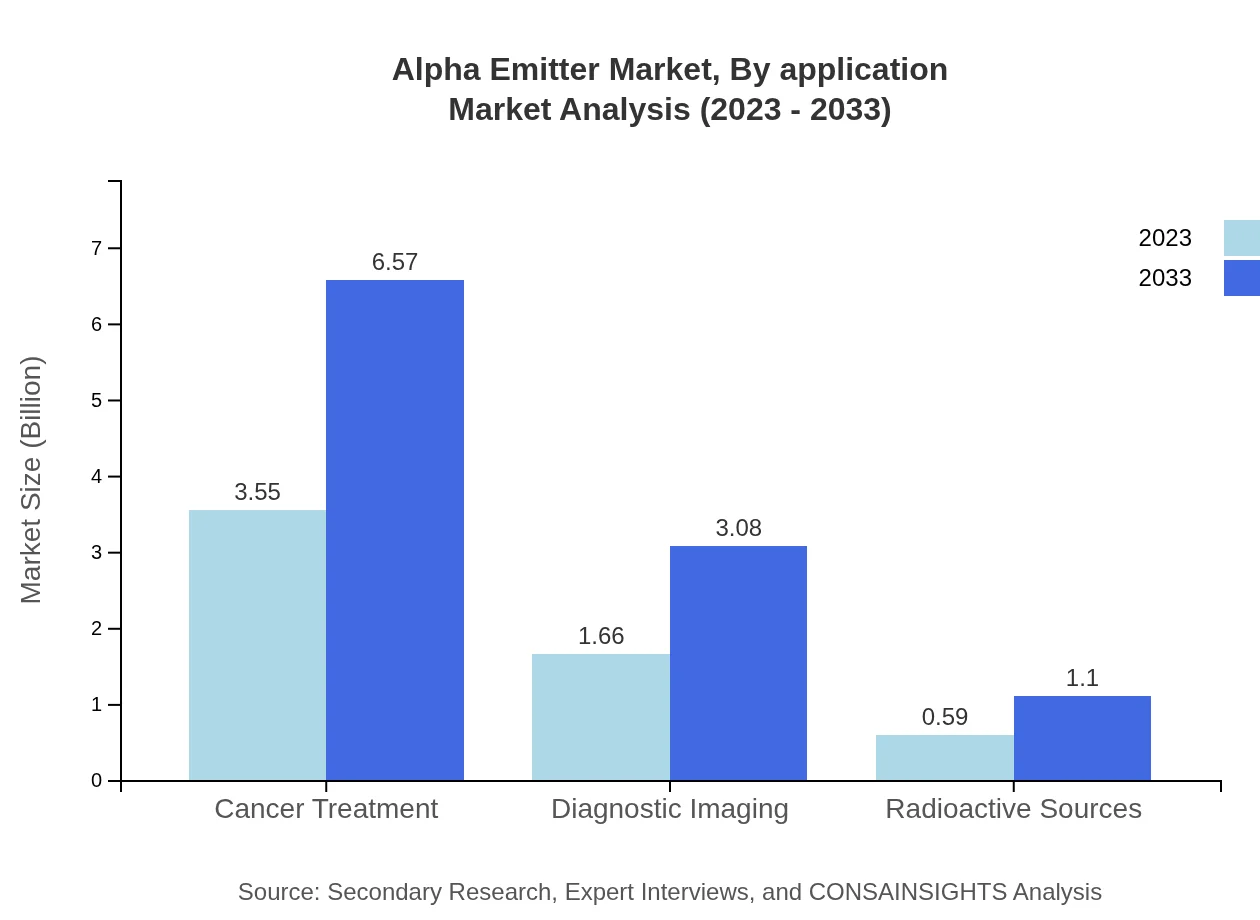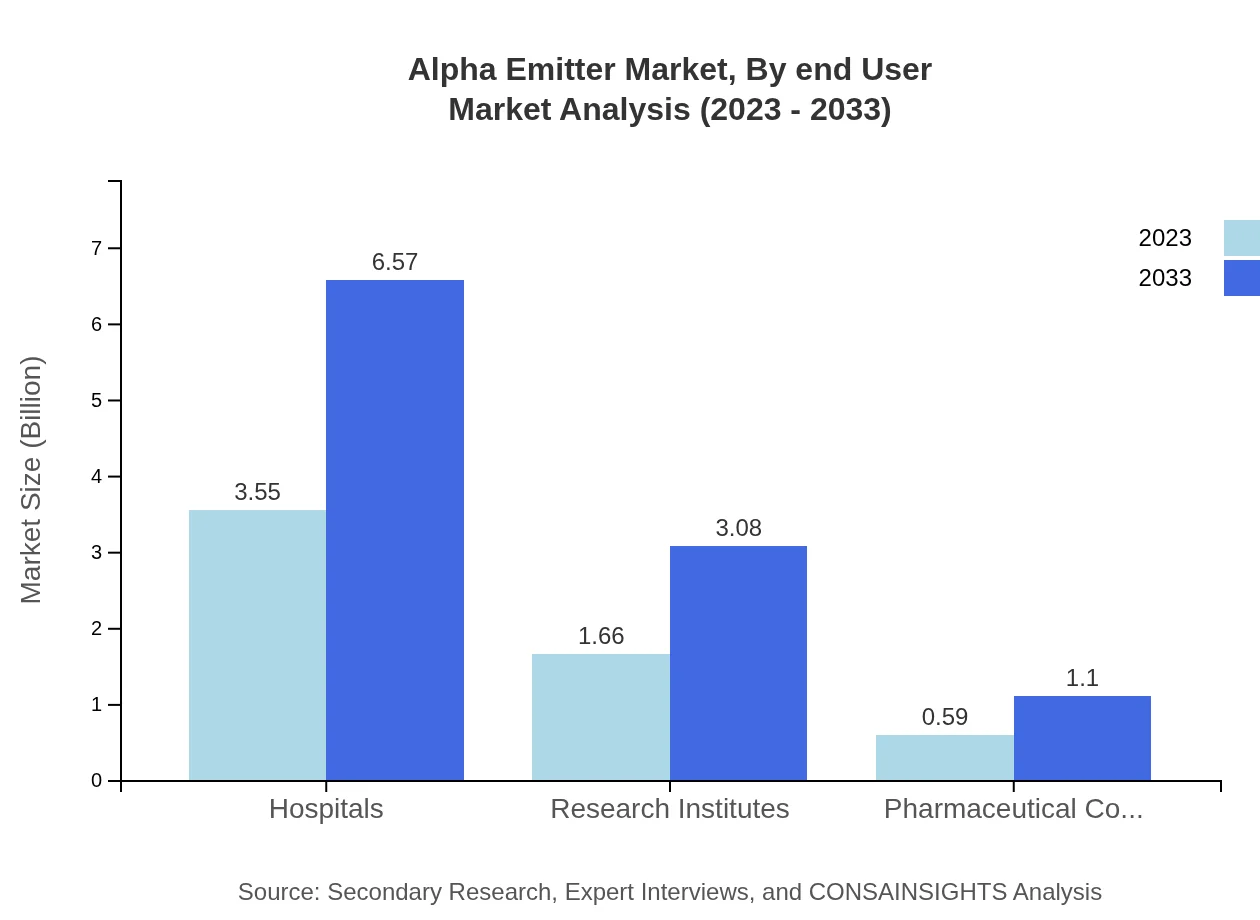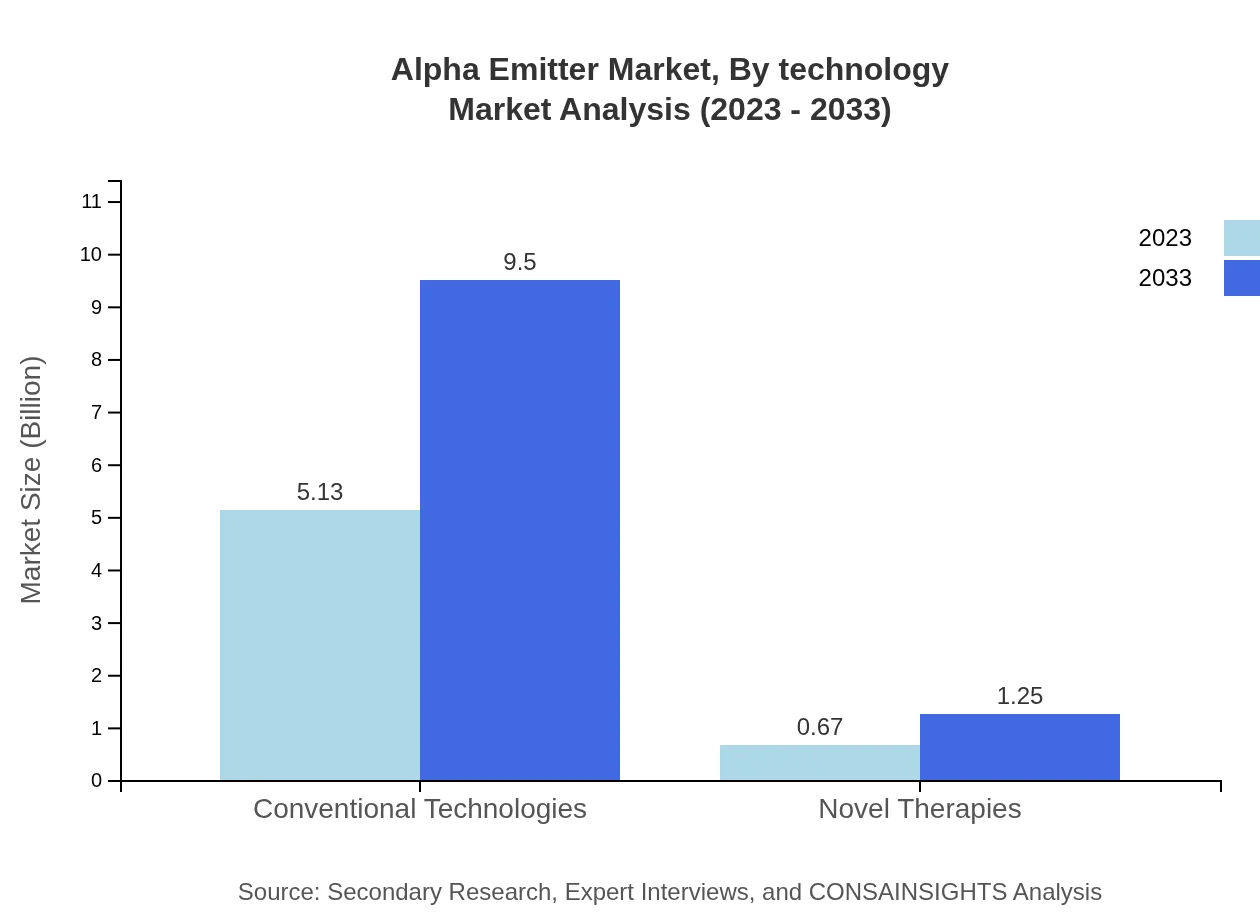Alpha Emitter Market Report
Published Date: 31 January 2026 | Report Code: alpha-emitter
Alpha Emitter Market Size, Share, Industry Trends and Forecast to 2033
This report provides a comprehensive analysis of the Alpha Emitter market, exploring market size, CAGR, segmentation, regional insights, industry trends, and key players, along with forecasts for the years 2023 to 2033.
| Metric | Value |
|---|---|
| Study Period | 2023 - 2033 |
| 2023 Market Size | $5.80 Billion |
| CAGR (2023-2033) | 6.2% |
| 2033 Market Size | $10.75 Billion |
| Top Companies | Bayer AG, Novartis, General Electric Company, Siemens Healthineers, Elekta AB |
| Last Modified Date | 31 January 2026 |
Alpha Emitter Market Overview
Customize Alpha Emitter Market Report market research report
- ✔ Get in-depth analysis of Alpha Emitter market size, growth, and forecasts.
- ✔ Understand Alpha Emitter's regional dynamics and industry-specific trends.
- ✔ Identify potential applications, end-user demand, and growth segments in Alpha Emitter
What is the Market Size & CAGR of the Alpha Emitter market in 2033?
Alpha Emitter Industry Analysis
Alpha Emitter Market Segmentation and Scope
Tell us your focus area and get a customized research report.
Alpha Emitter Market Analysis Report by Region
Europe Alpha Emitter Market Report:
The European Alpha Emitter market is estimated to grow from $1.41 billion in 2023 to $2.60 billion by 2033. The growth can be attributed to increasing government funding for cancer research and the establishment of regulatory frameworks facilitating market advancements.Asia Pacific Alpha Emitter Market Report:
In the Asia Pacific region, the Alpha Emitter market is predicted to grow from $1.16 billion in 2023 to approximately $2.15 billion by 2033. The increase is primarily driven by rising healthcare investments, government initiatives for cancer treatment, and growing awareness about targeted therapies.North America Alpha Emitter Market Report:
North America remains a dominant player in the Alpha Emitter market with an expected rise from $2.11 billion in 2023 to $3.92 billion by 2033. Key factors include the presence of leading biotech firms, extensive R&D activities, and a strong emphasis on innovation in cancer therapies.South America Alpha Emitter Market Report:
The South America market for Alpha Emitters is expected to see growth from $0.44 billion in 2023 to $0.82 billion in 2033. This growth is bolstered by improving healthcare infrastructure and the expansion of oncology treatment availability.Middle East & Africa Alpha Emitter Market Report:
In the Middle East and Africa, the market is anticipated to expand from $0.68 billion in 2023 to $1.26 billion by 2033. Growth drivers include increasing investments in healthcare, coupled with rising prevalence of cancers in the region.Tell us your focus area and get a customized research report.
Alpha Emitter Market Analysis By Product Type
The market segment for product types includes Conventional Technologies and Novel Therapies. By 2033, conventional technologies are expected to dominate the market, projected to grow from $5.13 billion in 2023 to $9.50 billion due to their established presence in therapeutic workflows. In contrast, novel therapies are also on the rise, predicted to grow from $0.67 billion to $1.25 billion, driven by advancements in precision medicine.
Alpha Emitter Market Analysis By Application
In applications, Cancer Treatment is projected to remain the largest segment, valued at $3.55 billion in 2023 and expected to reach $6.57 billion by 2033. Diagnostic Imaging is anticipated to follow, increasing from $1.66 billion to $3.08 billion, reflecting the continuous integration of radiopharmaceuticals in medical imaging.
Alpha Emitter Market Analysis By End User
Hospitals are the predominant end-users, expected to grow from $3.55 billion to $6.57 billion by 2033. Research Institutes and Pharmaceutical Companies also represent significant market shares, with revenues projected to rise from $1.66 billion to $3.08 billion and $0.59 billion to $1.10 billion, respectively.
Alpha Emitter Market Analysis By Technology
The market's technological landscape is split between Conventional Technologies and Novel Therapies. Conventional Technologies will maintain a large share, growing from $5.13 billion in 2023 to $9.50 billion, while Novel Therapies will gradually carve out their niche, expanding from $0.67 billion to $1.25 billion.
Alpha Emitter Market Trends and Future Forecast
Tell us your focus area and get a customized research report.
Global Market Leaders and Top Companies in the Alpha Emitter Industry
Bayer AG:
A leading global enterprise specializing in pharmaceuticals, Bayer has made significant advancements in radiopharmaceuticals, focusing on targeted cancer therapies utilizing alpha emitters.Novartis:
Known for its innovative approach in treatment solutions, Novartis has embraced the use of alpha emitters in its oncology pipeline, contributing to the enhanced efficacy of cancer treatments.General Electric Company:
GE Healthcare is at the forefront of diagnostic imaging solutions, integrating alpha emitter technologies to advance molecular imaging and therapy.Siemens Healthineers:
Siemens is a prominent player providing comprehensive healthcare solutions, focusing on harnessing alpha emitters for therapeutic advancements in oncology.Elekta AB:
Elekta is recognized for its innovative cancer treatment solutions and is actively engaged in the development of novel therapies using alpha emitters.We're grateful to work with incredible clients.









FAQs
What is the market size of alpha Emitter?
The alpha-emitter market is projected to reach approximately $5.8 billion by 2033, growing at a CAGR of 6.2%. This growth reflects rising demand within medical applications, particularly for cancer treatment, as well as advancements in technology and research.
What are the key market players or companies in this alpha Emitter industry?
Key players in the alpha-emitter market include companies involved in medical applications, research institutions, and pharmaceutical entities. Leading organizations are developing innovative treatments involving alpha-emitting isotopes, driving competition and advancements within the sector.
What are the primary factors driving the growth in the alpha Emitter industry?
Growth in the alpha-emitter industry is primarily driven by increasing cancer cases and the necessity for effective therapies. Technological advancements in treatment methods, heightened healthcare expenditure, and expanding research investments also contribute to this upward trend.
Which region is the fastest Growing in the alpha Emitter?
The Asia Pacific region is witnessing rapid growth within the alpha-emitter market, with market size expected to increase from $1.16 billion in 2023 to $2.15 billion by 2033. This growth is attributed to improving healthcare infrastructure and rising investments in medical technology.
Does ConsaInsights provide customized market report data for the alpha Emitter industry?
Yes, ConsaInsights offers customized market report data for the alpha-emitter industry. Tailored reports can provide specific insights based on client interests, driving data-driven decision-making and strategies unique to different stakeholders.
What deliverables can I expect from this alpha Emitter market research project?
Deliverables from the alpha-emitter market research project include comprehensive reports featuring market size analysis, growth forecasts, segmentation data, competitive landscape assessments, and actionable insights tailored to meet strategic business objectives.
What are the market trends of alpha Emitter?
Current market trends include a move towards targeted therapeutics using alpha-emitting isotopes, increased collaboration among research institutions, and a rise in clinical trials exploring novel therapies. Additionally, advancements in diagnostic imaging techniques are pivotal for growth.

